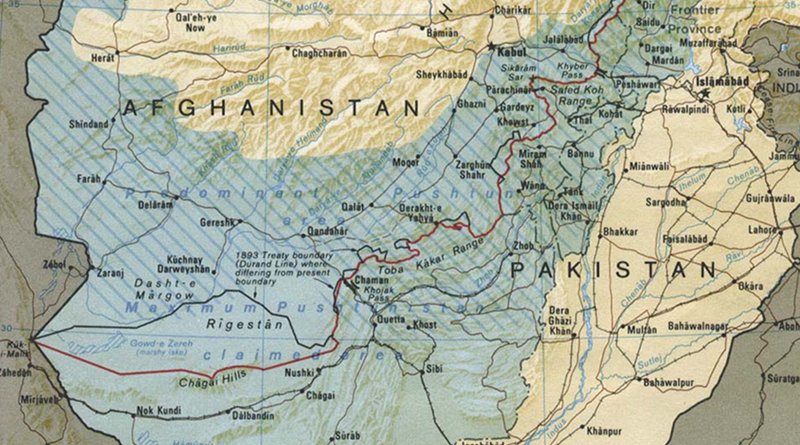The Durand Line: A Fiasco Instigated By Colonial Legacy – OpEd
By Asad Ali
Pak-Afghan relations have been plagued by Durand Line since the time Pakistan won freedom chiefly because of stalwart stance of Afghan governments over Durand line. British Raj before leaving the region conceivably left many conflicts unresolved due to which resources and energies of South Asian countries are consumed by war mongering mindset and human development has become a nuisance for millions of the people living on both side of border. Spurred by British colonial regime not only Pakistan but also India, Afghanistan, Sri Lanka, Myanmar, Iran, Nepal, China and Bangladesh have varied range of conflicts with neighboring countries including border skirmishes which have accelerated conflict and jeopardized peace in region.
The Durand Line fiasco is also legacy of British Raj—disputed border greatly aggravates an already worsening bilateral relationship between Pakistan and Afghanistan irrespective of common and shared Islamic civilization. In 19th century, Afghanistan became a ragdoll in so-called ‘Great Game’ between Russian and British empires. With expansion of Russia Czarist Empire began to move dangerously close to Pamirs, borderland of British India. In 1893, to secure control of the strategic Khyber Pass, the British had to send diplomat Sir Mortimer Durand to negotiate an agreement to delineate the border between Afghanistan and British India.
The new border, christened Durand Line, divided Pashtun tribal lands into British India and Afghanistan. The boundary has since then complicated Pak-Afghan relationship. The Durand Line, which is viewed by many Afghans as an arbitrary and nonsensical reflection of geography, history and culture, is an existential issue for Pakistan. During the partition stage of subcontinent, Afghanistan demanded a revision of border which however was denied by British. When Pakistan joined UN in 1947, Afghanistan was the only member nation to vote against its membership. Principally speaking, the matter of Durand line was between imperial British and Afghans whereas Pakistan got independence following many decades and thus Afghan have no ethical right to assert their claim on any territory after it was appropriated to present day Pakistan shadowing lawful course of action. It was referendum of people of North Western Frontier Region that they wanted their allegiance with Pakistan and Afghan government should have honored the will of people.
In fact, it was only after the consistent blowback from Afghanistan side that Islamabad thought of fencing volatile border between two countries to keep a good check on drug traffickers, small weapon paddlers, criminals, and terrorists who always have been taking advantage of porosity of border. It is widely believed that Afghan governments use this dead issue for political point scoring at the behest of anti-Pakistan elements in the local as well as global political arena. The 20th century has experienced many geographical demarcations and dozens of new countries have risen to world map. Yugoslavia, Russia, India, Turkey, Middle East and many parts of world have been disintegrated losing their past prestige and most of countries have accepted this phenomenon by promoting bilateral relations in exchange for economic advantages.
EU and states emerging after disintegration of USSR are a living example where new emerging countries are amicably coexisting with their past colonial masters. The modern age is of cooperation and constructive adherence where there is little room for conflicts while more concentration is centered on human development. There is no permanent foe or friend in global politics rather mutual relations are built on economic standoff. The developed nations are exploring new avenues in space, cyber, data science and in discipline of Artificial Intelligence. It will be more prudent for the developing countries to follow their footprints to improve the living standards of their people through proactive approach.
Pakistan has argued that Durand Line is a legitimate border and that state of Pakistan has legally inherited border as legitimate successor state of British India. Pakistan cannot afford to experience any other debacle after fall of Dhaka. Although Pakistan is sandwiched between New Delhi and Kabul it still has potential to show resilience to both. Islamabad has always been willing to risk a dynamic and powerful Afghan state controlling its own affairs provided the Durand-line issue is not politicized and Afghanistan should also learn that as a landlocked country it has its dependency on Pakistan for import of basic food items unable to curtail Pakistan with a small and ineffectual army. It is in best interest of Afghanistan to forget past and move forward before it is too late because people of Afghanistan are facing many challenges due to wrong decision of its elitists. According to a report of Dawn on 5 March 2017, Hamid Karzai has vehemently told that Pakistan has no legal authority to dictate terms on Durand line. Pakistan has always supported Afghanistan on international platforms and till date is a sanctuary of millions of Afghan refugees. It is biggest trade partner of Afghanistan in region and already crippled economy of Afghanistan can be choked if Pakistan pulled its support for Afghan people. Not only government of Pakistan but also many NGOs of Pakistan are sending humanitarian aid to the war torn and hunger-stricken people of Afghanistan.
The new regime of Taliban in Afghanistan should realize that it is only Pakistan which is still convincing global community including America on public-spirited grounds to not to leave Afghanistan in lurch. Taliban are key beneficiaries of the outcome of series of dialogues smoothed by Pakistan and they should not camouflage their failure in Afghanistan by creating tension on border. Pakistan considers Durand Line as settled. The world powers particularly America should come forward and encourage Afghan government to initiate a sincere domestic debate on the issue of Durand Line as only this initiative can guarantee stability of Afghanistan and its economic revival accessed through trade and transport corridors to Pakistani ports.
*The writer is an Islamabad based expert of South Asian Affairs

